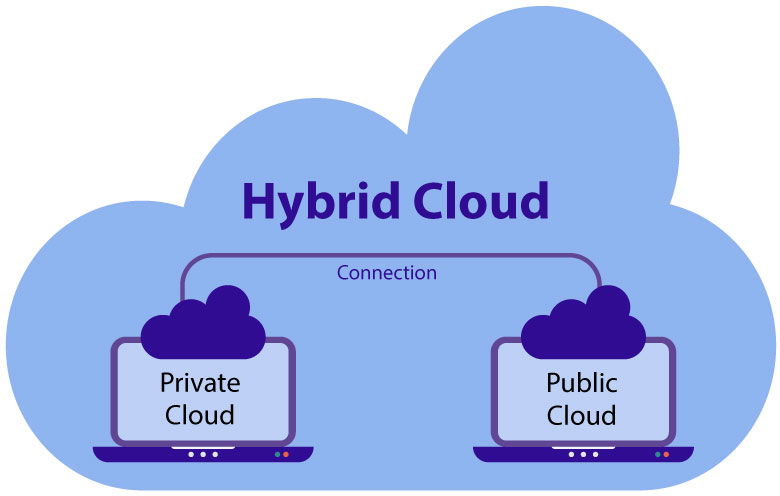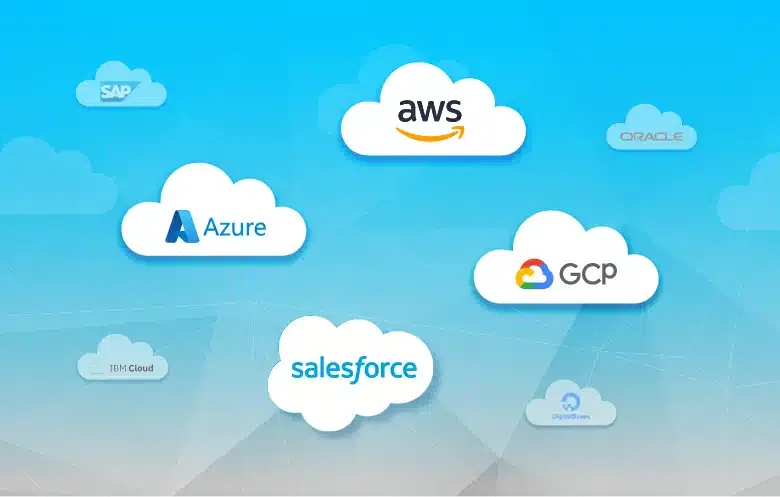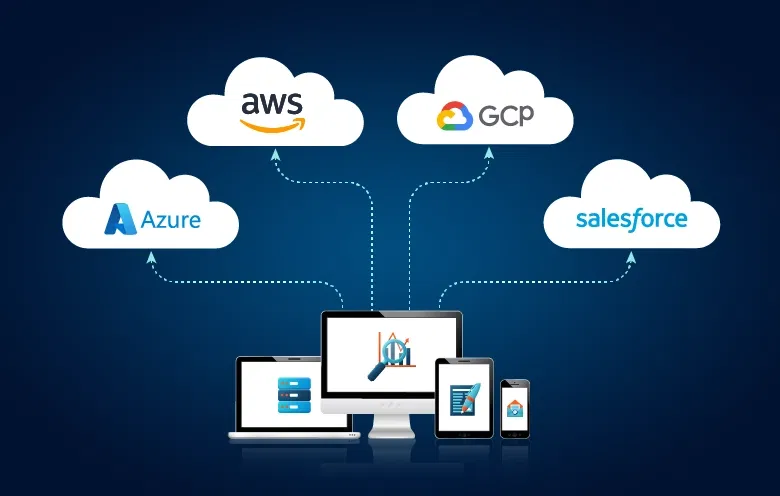A hybrid cloud is a computing environment, in which hardware and software is running on the privately managed data center of the company, being supported by the public in the cloud technology shared and provided by a third party. About this, many establishments are likely to formulate and enforce uniform governance, security, and privacy policies that extend to the IT systems they use regardless of the kind of technology, for instance, on-premises or cloud-based resources.
What will be used in the execution of these high standards is going to vary. The cloud providers take care of the network and computing and storage from their customers in the same manner in which on-premises systems are managed by internal personnel.
Traditional cloud environments including on-premises systems operate in collaboration in a hybrid cloud model. Hybrid cloud is an overarching term which includes various kinds of infrastructure, and cloud service as well as the on-site components, that are integrated in some ways and exchange data.
How does hybrid cloud work?

Hybrid functionally is a co-ordination of the operation of both in-house IT staff and the public cloud supplier’s responsibility. This could can be exemplified by a cloud model that uses colocation, where applications are managed by the cloud provider but stored in the private data center owned by an organization. In that case, the local IT team is responsible for managing the power, cooling and general operations of the data center, whereas the cloud services provider is responsible for undertaking the maintenance of certain hardware and software that depend on the service type either SaaS, PaaS, IaaS, or the combination of three.
A managed service provider can build you a bridge that offers a holistic view of the distributed cloud environment in that system managers can monitor the multilinked nodes through this platform. Another relationship between systems is what is pertained to as shared security, networking, and data integration.
Suggested: Successful businesses must be cloud-based. Why?
Hybrid cloud use cases
- Public cloud migration: A hybrid cloud solution may serve as an initial operation for a company that seeks to stay with its internal data center by steadily moving computing architecture into a public cloud, with the long-term purpose of finally giving up its on-site data center. The shift of an economy can be seen as a long-term process and a hybrid strategy that will be the key until the customer base is established.
- Data residency: While it is true that premises may at times be more convenient, businesses need to remember that they may need to liaise with cross-border data flows, depending on the nature of their activities. One way is to add cloud resources from the public cloud within a company’s own data center.
- Application development: Companies take the app development process to Start the job onsite, but when through, the apps are hosted on a public cloud for production processing. And again, sometimes, it is just the opposite feeling. In the case of containers, most environmental factors are covered when they are packaged into applications.
- Legacy applications: Although the latest generation applications are supplanting SaaS, the rest of the old qualifiers still live on There are hybrid clouds that can be used by those with on-premises and cloud apps to exchange data.
- Emerging technology: The public cloud enables companies to immediately benefit from the latest technological innovations in the field including using cloud resources for example for computationally intensive operations necessary to deliver the desired result of the AI algorithm training. The mixed environment is not only a source of capital but is also available without an expensive capital investment barrier.
- Application integration: As a part of working, sometimes organizations are obligated to incorporate some on-premises applications, for example, a point-of-sale and inventory management program, which are essentially a suite of cloud-based ERP and financial systems.
- Unified platform: A handful of companies are so enthusiastic about using proprietary platforms, such as VMware, to handle all IT components both internally and in the cloud, and a hybrid cloud implementation allows this to happen. Container technologies like Kubernetes not only make it easier to standardize operations but also ensure the smooth functioning of applications in data centers.
Understanding the difference between Hybrid cloud and Multi-cloud
| Features | Hybrid Cloud | Multi-cloud |
|---|---|---|
| Cloud types | Public cloud + Private cloud (on-premises or dedicated servers) | Multiple public clouds from different providers |
| Architecture | Integrates different environments (public and private) | Operates in silos (each public cloud is separate |
| Data storage | Data can be stored in both public and private clouds | Data is typically stored in public clouds |
| Use case | Ideal for organizations with sensitive data or specific compliance requirements | Suitable for leveraging best-of-breed services from different providers |
| Control | Provides greater control over data and applications in the private cloud | Generally simpler to implement and manage |
| Vendor or lock-in | Potential lock-in to specific vendors for private cloud or public cloud services | Reduced vendor lock-in as workloads can be distributed across different providers |
Suggested: Multi-cloud vs hybrid cloud
Hybrid cloud benefits
- Scalability: Scaling up traditionally means buying more servers and equipment, which is a hefty upfront cost. Hybrid clouds let you seamlessly burst into the public cloud for extra processing power during peak times. It’s like having a friend with a giant TV for those movie marathons – you only pay when you use it!
- Secure your data: Security is a top priority, and a private cloud within your hybrid setup acts like a vault for your sensitive information. You have complete control over who sees what. For tasks that require more processing power, the public cloud acts like a trusted partner. By encrypting data before it goes out, you can ensure its safety during the transfer, like sending a package with a lock.
- Cost-effective: Hybrid clouds are like fuel-efficient cars – they save you money over time. Scaling up is easier and cheaper, and you avoid the hidden costs of migrating data between multiple cloud providers, which can be like paying double rent when you move apartments.
- Take control of your data: Unlike a public cloud where you share resources, a hybrid cloud lets you call the shots in your private environment. It’s like having a designated workspace in your condo where you can customize everything to fit your needs. This control allows you to fine-tune which parts of your workload run where, ensuring optimal performance.
- Speed up the process: A hybrid cloud gives you the best of both worlds: the control and efficiency of your private cloud and the raw power of the public cloud. Think of it like having a dedicated highway entrance and exit for your condo – you can avoid traffic jams and get where you need to be much faster. Additionally, private clouds can be optimized for specific tasks, further reducing processing time.

Cloud strategy and assessment workshop
The adoption of cloud-based infrastructure by enterprises is increasing greatly. However, a lot of enterprises are still reluctant to adopt a cloud strategy due to lack of skills or knowledge.
Modernize your business with Softweb Solutions
As with most advanced technologies, hybrid cloud infrastructure is soaring. For businesses looking to modernize their business operations, we have certified sources and expertise to understand your cloud needs. And when properly protected, hybrid cloud infrastructure is not only safe, but it can also help increase the business’s security profile.



